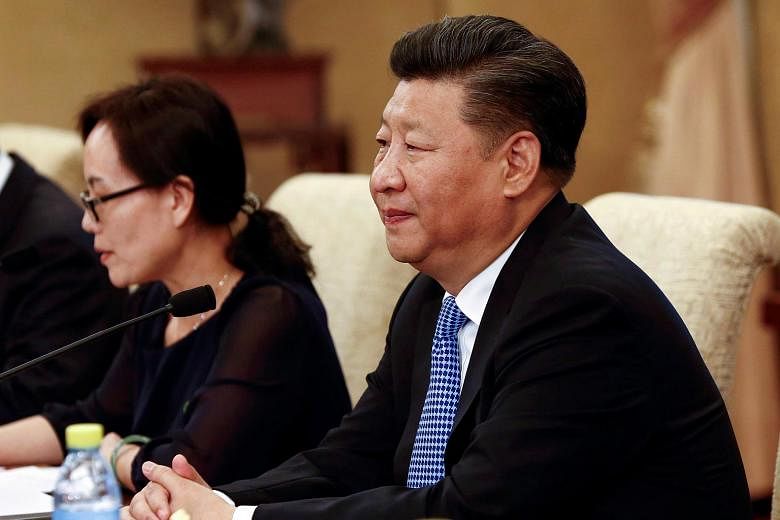BEIJING (Reuters) - Chinese President Xi Jinping has reshuffled three top provincial-level Communist Party posts as he seeks to place his men in key positions ahead of a once-every-five-years congress next year, and more new appointments are likely soon.
In a brief dispatch on Sunday, the official Xinhua news agency named two people with whom Mr Xi had previously worked as the new party chiefs in the strategically located southwestern province of Yunnan and the populous southern province of Hunan. The provincial party chief outranks the governor.
In Yunnan, bordering Myanmar, Laos and Vietnam, Mr Chen Hao replaced Mr Li Jiheng, while in Hunan, Mr Du Jiahao had assumed the party's top job, Xinhua said.
Both Mr Chen and Mr Du worked with Mr Xi when he ran China's commercial capital, Shanghai, as its Communist Party chief for a year in 2007, according to their resumes.
"Xi is close to both of them due to their time together in Shanghai," a source with ties to the leadership told Reuters, speaking on condition of anonymity.
The party congress, expected to be held next autumn, will see Mr Xi further cement his hold on power by appointing close allies into the party's ruling inner core, the 25-member Politburo and the seven-member Politburo Standing Committee.
Mr Xi, who doubles as Communist Party and military chief, is ranked No. 1 in the Standing Committee - the apex of power in China.
The year leading up to that will focus on Mr Xi appointing more new people into major provincial party and government positions, sources with ties to the leadership say.
Tibet, considered one of the country's most politically sensitive positions due to periodic anti-Chinese unrest in the devoutly Buddhist Himalayan region, also has a new party chief, named by Xinhua as Mr Wu Yingjie.
Mr Wu has spent almost his entire career in Tibet, according to his official resume, having previously served as a deputy governor and propaganda chief, among other roles.
Mr Wu, like his predecessor Mr Chen Quanguo, belongs to China's majority Han Chinese ethnic group. Xinhua said Mr Chen would be taking another position, without giving further details.
China says its rule has brought prosperity and stability to Tibet, rejecting claims from Tibetan exiles and rights groups of widespread repression.
The source said Mr Chen would likely go to Xinjiang, another unruly part of the country, due to what the government says is a concerted Islamist-backed campaign of violence in a region with a large ethnic minority Muslim population.
Current party boss Zhang Chunxian is expected to move to Beijing to take over a senior role in a party building committee that Mr Xi is overseeing as part of his efforts to instil greater discipline in the corruption-racked party, the source added.
A second source said the governor in Shanxi, a coal-rich northern province beset by corruption scandals, would move to Beijing to take over as transport minister.
Mr Li Xiaopeng is the son of former premier Li Peng, who was deeply involved in the military crackdown on student-led demonstrations for democracy around Beijing's Tiananmen Square in 1989.
The second source said Xi ally Lou Yangsheng, currently a deputy party boss in Shanxi, would be named acting provincial governor, pending approval by the local legislature.
Mr Xi and Mr Lou worked together when Mr Xi was party boss in the eastern province of Zhejiang from 2003 until early 2007.
The State Council Information Office, which doubles as the party's spokesman's office, did not respond to a request for comment.

